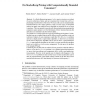Free Online Productivity Tools
i2Speak
i2Symbol
i2OCR
iTex2Img
iWeb2Print
iWeb2Shot
i2Type
iPdf2Split
iPdf2Merge
i2Bopomofo
i2Arabic
i2Style
i2Image
i2PDF
iLatex2Rtf
Sci2ools
104
click to vote
WINE
2009
Springer
2009
Springer
On Stackelberg Pricing with Computationally Bounded Consumers
In a Stackelberg pricing game a leader aims to set prices on a subset of a given collection of items, such as to maximize her revenue from a follower purchasing a feasible subset of the items. We focus on the case of computationally bounded followers who cannot optimize exactly over the range of all feasible subsets, but apply some publicly known algorithm to determine the set of items to purchase. This corresponds to general multi-dimensional pricing assuming that consumers cannot optimize over the full domain of their valuation functions but still aim to act rationally to the best of their ability. We consider two versions of this novel type of Stackelberg pricing games. Assuming that items are weighted objects and the follower seeks to purchase a min-cost selection of objects of some minimum weight (the MIN-KNAPSACK problem) and uses a simple greedy 2-approximate algorithm, we show how an extension of the known single-price algorithm can be used to derive a polynomial-time (2 + ε)-...
Related Content
| Added | 25 May 2010 |
| Updated | 25 May 2010 |
| Type | Conference |
| Year | 2009 |
| Where | WINE |
| Authors | Patrick Briest, Martin Hoefer, Luciano Gualà, Carmine Ventre |
Comments (0)

